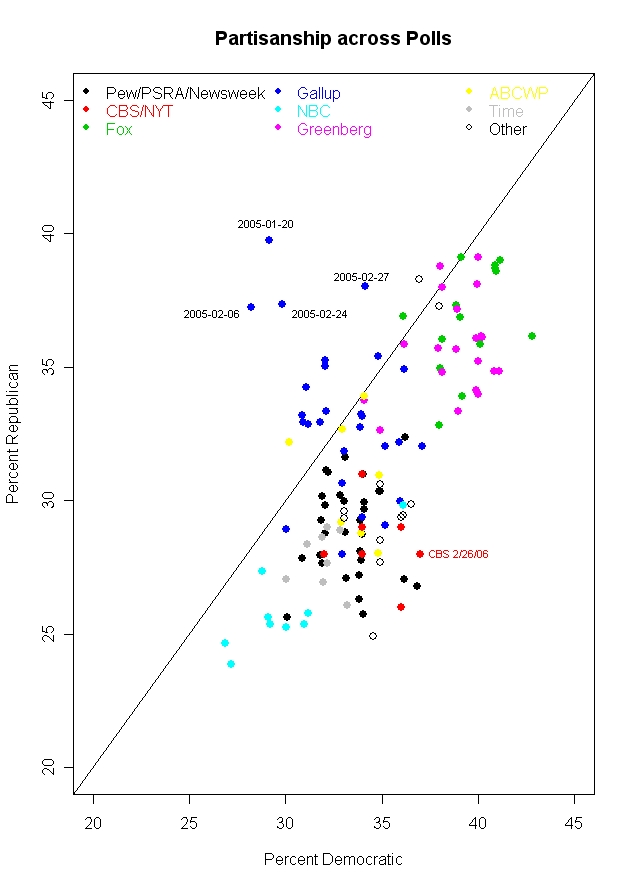The latest CNN/USAToday/Gallup poll is out this morning, and it generally confirms the results of the surveys released earlier in the week from CBS News, Cook-RT Strategies and the Rasumussen automated poll. Gallup has two releases up (free and available to all through the weekend) that show strong opposition to the proposed sale of seaport operations to a company from the United Arab Emirates and Bush’s job performance rating falling to “within one point of the lowest of his administration.” As always the results are also available from both USAToday (story and results) and CNN (which posts both a story and new suitable-for-printing PDF with full time-series results).
The specifics:
- 38% now say they approve of the job George Bush is doing as president, while 56% disapprove. The approval rating is five percentage points lower than the 43% that Gallup measured throughout January.
- 66% say they oppose the “proposed sale [of cargo operations at several major U.S. seaports to a company from the United Arab Emirates],” and only 17% favor it.
- 47% now approve of Bush’s handling of terrorism, while 49% disapprove. This rating is “by one point the lowest Gallup has measured,” according to the Gallup summary.
The same report by Gallup’s Frank Newport concludes:
Terrorism has long been Bush’s greatest strength, and it is notable that the current 47% approval is still higher than his approval on any of the other issue areas, and nine points higher than his overall approval rating.
Still, the fact that the president’s terrorism rating has fallen below 50%, and is at the low point of his administration, suggests that the recent Dubai port controversy may be hurting his image on national security and fighting terrorism.
PS: The Gallup survey shows party identification for this survey as 32% Republican, 31% independent and 35% Democratic, with 3% unsure. Like the CBS poll released earlier this week, Gallup has slightly more Democrats and slightly fewer independents than in other surveys conducted since January (I get an average for their five prior surveys in 2006 as 33% Republican, 32% Democrat and 34% independent).
Also, Charles Franklin posted an excellent discussion yesterday (before the latest Gallup results were available) on how partisanship varies across surveys. It includes an amazing, must-click graphic (reproduced below – click to see the full version on Franklin’s site, click again to magnify it). Plot the new Gallup result for party ID on that chart and you’ll see the point I made above.

Franklin promises a series of posts on partisanship over the next week, which should be worth watching.
PPS: Just when I thought it was safe to pay attention to my “day job.” New surveys are also out this morning from Fox News and LA Times/Bloomberg that show the Bush job approval rating at 39% and 38% respectively (hat tip: RCP). And the Rasmussen daily automated survey is now down to 42% approval: “Except for a brief period around the time of the Harriet Miers’
nomination, this is the lowest Job Approval Rating ever recorded” for Bush by Rasmussen.
Charles Franklin’s methodological observations are informative. Personally, as we approach the midterms, I am looking forward to his next report, on recent trends on how party identification is changing over time, once he controls for the various house effects.
Also, in the comments on Franklin’s analysis, Yet Another John offers the reminder that party identification is not synonymous with votes cast. Invariably, Republican Presidential candidates suffer few defections from Republican-identified voters while attracting a substantial minority of Democratic-identifiers. Democratic candidates have no such routine success: they fail to keep all their partisans loyal and they persuade few Republican-identifiers to switch.
In short, partisan identification levels in polls underpredict success for Republicans and overpredict success for Democrats. Just Another John says this is true for Presidential elections. He makes no claim about midterms. Does anyone know if the same applies?